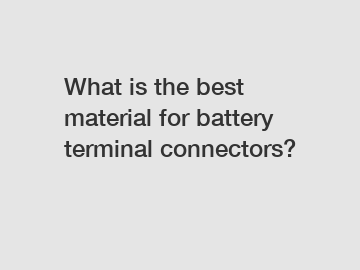When it comes to battery terminal connectors, choosing the right material is crucial for ensuring optimal performance and durability. The material you choose can have a significant impact on the overall efficiency and longevity of your battery system. With a wide variety of materials available, it can be overwhelming to determine which is the best option for your specific needs. In this blog, we will explore the most common materials used for battery terminal connectors and discuss their unique properties to help you make an informed decision.
Copper is one of the most popular materials used for battery terminal connectors due to its high conductivity and excellent corrosion resistance. Copper is an excellent conductor of electricity, allowing for efficient transfer of power between the battery and the connected devices. Its superior conductivity helps to minimize energy loss and maximize the overall performance of the battery system. In addition, copper is highly resistant to corrosion, making it an ideal choice for applications where exposure to moisture or other harsh environmental conditions is a concern.
Another common material used for battery terminal connectors is brass, which is an alloy of copper and zinc. Brass offers a good balance of conductivity and strength, making it a versatile choice for a wide range of applications. Brass connectors are known for their durability and resistance to corrosion, making them a reliable option for long-term use. Additionally, brass connectors are relatively easy to work with, allowing for flexibility in design and installation.

Aluminum is another material that is commonly used for battery terminal connectors, particularly in automotive and marine applications. Aluminum is lightweight and offers good conductivity, making it a practical choice for situations where weight is a concern. While aluminum is not as conductive as copper, it is still a viable option for many applications. However, aluminum is more prone to corrosion than copper or brass, requiring additional protective coatings to ensure long-term durability.
Nickel-plated connectors are another popular option for battery terminals, offering a good balance of conductivity and corrosion resistance. Nickel plating provides a protective barrier against moisture and other corrosive elements, helping to extend the lifespan of the connector. Nickel-plated connectors are also known for their aesthetic appeal, with a shiny finish that can enhance the overall appearance of the battery system.
In recent years, there has been a growing interest in using stainless steel for battery terminal connectors. Stainless steel offers excellent corrosion resistance and durability, making it a reliable choice for harsh environments. Stainless steel connectors are also very strong and can withstand high levels of mechanical stress, making them suitable for heavy-duty applications. While stainless steel is not as conductive as copper, it is still a viable option for many applications where corrosion resistance is a top priority.
When choosing the best material for battery terminal connectors, it is important to consider the specific requirements of your application. Factors such as conductivity, corrosion resistance, strength, and weight will all play a role in determining the most suitable material for your needs. It may be necessary to consult with a professional to ensure that you select the right material for your specific application.
In conclusion, there are several materials to choose from when selecting battery terminal connectors, each offering unique benefits and advantages. Copper, brass, aluminum, nickel-plated, and stainless steel are all popular choices, each with its own set of properties that make them suitable for different applications. By understanding the characteristics of each material and considering the specific requirements of your application, you can make an informed decision on the best material for your battery terminal connectors. Remember, the right material can make a significant difference in the performance and longevity of your battery system.
For more information, please visit high-quality motor connector, waterproof signal connector, higo waterproof motor connectors supplier.




Comments
Please Join Us to post.
0